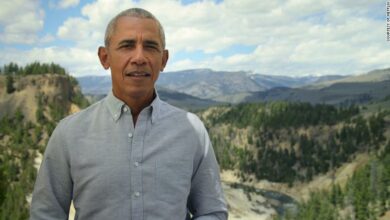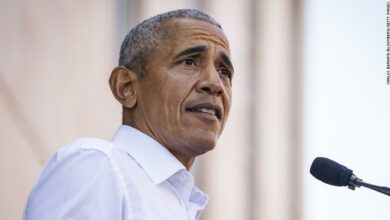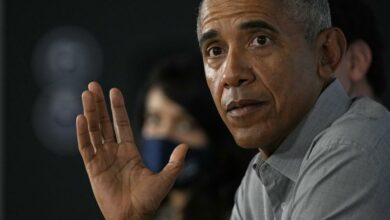US President Obama’s visit to Egypt dominated the headlines of the local publications over the past week. The latter’s largely positive coverage however contrasted sharply with the online media, writes Hossam El Hamallawy
As early as the beginning of last week, the state-owned papers’ front pages carried editorials and news reports, highlighting Egypt’s “central role in the region” as Al-Ahram put it on Monday. The same theme was echoed in Al-Akhbar which also highlighted Obama’s statements in Saudi Arabia on 3 June, mentioning Mubarak as a “force for stability in the Middle East,” affirming that Washington “does not seek to impose its values” on other countries. The state-run Al-Gomhoriyya also praised the choice of Cairo by Obama stressing that “the Muslim World will be waiting” to hear what the young American president had to say.
The independent publications, more or less, adopted a similar celebratory, yet more cautious, tone in tackling the president’s visit, though more space (compared to the state-owned publication) was devoted to other news. Al Destour flushed out issues such as suspected Swine Flu cases. Al Destour also dedicated space for expanded coverage of labor strikes, with a focus on the Tanta Flax and Oil Company workers, who’ve been staging industrial action since 31 May.
The opposition Al-Wafd focused its coverage on the security preperations in the capital and the inconvenience it would cause citizens. The paper also devoted wide coverage at the same time to the Lawyers’ Syndicate’s elections and the ongoing war of words between Sameh Ashour, the previous syndicate head, and the Muslim Brothers who voted against him.
On the day of the speech, virtually all publications had pictures of Obama or Cairo University on their front pages. And while the “Egypt’s centrality” theme dominated the state-owned press, the independent Al Dustour asked whether Obama’s team was going to be checked for Swine Flu at the Cairo Airport. The independent Al Shorouk also ran reports on the security operations in the capital, “sincerely advising citizens to stay at home” because life was to be brought to halt in Cairo and Giza. Al Shorouk also pointed out there was ongoing campaign of arrests by the police in Bein Al Sarayat area, close to Cairo University. The indpendent Al-Youm7 reported on increasing police presence in the railways and metro stations and public squares. Al-Wafd also described the university campus as a “no go zone” for Egyptians.
The morning following the speech, the front pages of Al-Ahram, Al-Akhbar and Al-Gomhorriya ran pictures of Obama on the Cairo University stage giving his address. Al-Ahram alone devoted 10 pages for covering the event, announcing it was “a new beginning from Cairo between America and the Muslims.” Other independent newspapers followed suit. Al-Akhbar’s Mohamed Barakat labeled Obama as the “new face of America.”
Contrary to the rest of the govenrment publications, Al-Gomhorriya claimed “life did not stop in Cairo and Giza.” And while all carried the celebratory tone, Al Dustour’s editor Ibrahim Eissa ran a passionate editorial describing how “embarrassed” he was by the “naive childish” attitude of the audience who clapped their hands for Obama when he tried speaking some Arabic words. Eissa charged there was hardly any difference between Obama and his predecessor’s policies. Al Dustour also enquired into why Mubarak did not accompany Obama on his Cairo tour.
In cyberspace, the picture was different. The overriding tone in the Egyptian blogosphere and among Twitter users was largely negative of Obama, with strong criticisms and accusations of hypocrisy, that exploded into live-tweets during the US president’s speech.
Some bloggers were invited to attend the speech including Wael Abbas who wasn’t impressed by the speech, accusing those who were clapping as “stupid teenagers watching a performance by (local singer) Tamer Hosni,” he wrote in a Tweet, adding: “I overheard security people discussing the absence of a lot of students and how it is not going to look good because the hall is half empty.”
Another blogger, “Sandmonkey,” a self-described neocon with a well known sense of sarcasm, ridiculed Obama for mispronouncing Arabic words, like “hajeeb” instead of “hijab.” SM’s sarcasm was shared by another blogger, on the other end of the political rainbow, who goes by the name “Revolutionary Socialist” who tweeted: “el azaaaaaaaaaaaaaaar? Whats that obama???”
Another Tweeter, Wael Khalil, was angry Obama made reference to the holocaust in support of Israel’s right to exist: “Same old Holocaust justification for Israel. Dude, it wasn’t us, it was the Germans.” Later Wael likened Obama to Bush.
Eman Abdel Rahman, who blogs under the name, Lasto Adri, was willing to give Obama a chance, yet she was disappointed. “Obama is not as amazing as I thought at first,” she tweeted. “I don’t believe his lies about Afghanistan… I feel it’s so much filled with polishing for US rather than addressing the Muslim world.”
The only supportive tweets more or less were coming from Dalia Ziada of the American Islamic Congress, who described Obama’s speech as “terrific and inspirational” , only to be met with a tweet from Yasary Masry: “Shame on you!”
After Obama’s speech came to an end, Tweeter Nora Shalaby called it “completely patronizing,” while Sandmonkey tweeted: “Just met with PR people, they are the ones most impressed by how PR-like his speech is: all comfort and happy, no obligations. sweet!”
Egypt




